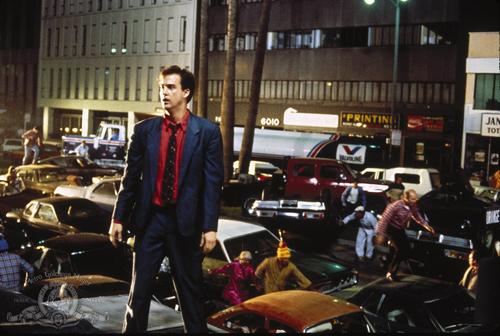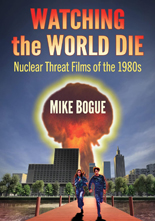
On the cusp on turning 12, I was floored by the March 20, 1983, broadcast of Special Bulletin, the NBC made-for-TV movie designed to look like a real-time news broadcast of a nuclear incident on the East Coast, courtesy of domestic terrorists. Although I knew it was fake, the effect was so chilling that exactly eight months later, my mom forbade us from watching ABC’s highly contentious The Day After, in which the threat — and eventual nukes — came not from our own, but the Soviet Union.
We American kids grew up with the fear, worry and anxiety of nuclear war as all too tangible. U.S.-Soviet relations were so bad, the mushroom clouds were not a question of if, but when.
You had to be there. Be glad you weren’t.
Not to say 2024 is all wine and roses; despite the Cold War in our collective rearview mirror, we’re inching closer to That 1983 Feeling than we’ve ever been. At least today, we have Mike Bogue’s Watching the World Die: Nuclear Threat Films of the 1980s to keep us company. Just hopefully not in a bunker.

Something of a companion to Bogue’s previous tome, 2017’s Apocalypse Then (which focused on 1950s atomic cinema and shares McFarland & Company as publisher), Watching the World Die is, rather surprisingly, not the grim, doom-and-gloom read I expected. Documentaries aside, which the author purposely doesn’t include, the decade’s movies on the topic were largely escapist, thereby taking the edge off. Having characters like Yor, C.H.U.D., Hulk and Godzilla romping around will do that.
In all, Bogue casts his critical eye on 121 films in detail, from populist blockbusters (WarGames), well-intentioned flops (Superman IV: The Quest for Peace) and indie darlings (Miracle Mile) to three James Bond entries and many more Italian SFers. However, where Watching the World Die most excels is in rummaging through the junk drawer of VHS obscurities — not because Bogue’s writing differs in these essays (it doesn’t), but because the flicks get bonkers.
You may have heard about the Steve Barkett ego project The Aftermath, but what about Thomas A. Cohen’s survivalist family saga, Massive Retaliation? The Dack Rambo vehicle Ultra Warrior? Or Canada’s Survival 1990 with its dog-eating mutants? Giving attention to such forgotten B- and C-level genre productions is something of an archeological dig of unpopular culture; that Bogue’s shovel dug that deep into oblivion is enough to forgive his book’s exclusion of comedies — the intentional kind, I mean. —Rod Lott

